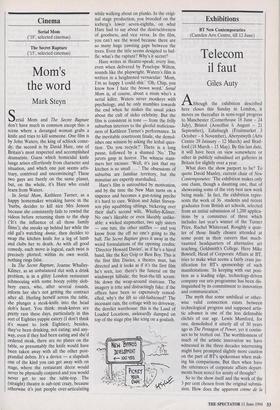Cinema
Serial Mom (`18', selected cinemas) The Secret Rapture (`15', selected cinemas)
Mom's the word
mark Steyn Serial Mom and The Secret Rapture don't have much in common except this: a scene where a deranged woman grabs a knife and tries to kill someone. One film is by John Waters, the king of schlock come- dy; the second is by David Hare, one of Britain's most respected and accomplished dramatists. Guess which homicidal knife lunge arises effortlessly from character and situation, and which one just seems arbi- trary, contrived and unconvincing? These two guys are barely on the same planet, but, on the whole, it's Hare who could learn from Waters.
In Serial Mom, Kathleen Turner, as a happy homemaker wreaking havoc in the 'burbs, decides to kill nice Mrs Jenson because she consistently fails to rewind the videos before returning them to the shop (It's the influence of all those family films'); she sneaks up behind her while the old gal's watching Annie, then decides to swap the kitchen knife for a leg of lamb and clubs her to death. As with all good comedy, each move is logical, each twist is precisely plotted; within its own world, nothing rings false.
In The Secret Rapture, Joanne Whalley- Kilmer, as an unbalanced slut with a drink problem, is in a glitzy London restaurant schmoozing with some boozy yobby slob- bery execs, who, after several rounds, inform her she's not getting the contract after all. Hurling herself across the table, she plunges a steak-knife into the head slob's heart. You think: steak-knives are pretty rare these days, particularly in this sort of Eighties yuppie eatery (I don't think it's meant to look Eighties); besides, they've been drinking, not eating; and any- way, even if they had been eating and she'd ordered steak, there are no plates on the table, so presumably the knife would have been taken away with all the other post- prandial debris. It's a device — a slapdash one of the kind you can get away with on stage, where the restaurant decor would never be physically conjured and you would never get to see the table-top. The (straight) theatre is sub-text crazy, because otherwise it's just people over-articulating while walking about on planks. In the origi- nal stage production, you brooded on the iceberg's lower seven-eighths, on what Hare had to say about the destructiveness of goodness, and vice versa. In the film, you can't see the wood because there are so many huge yawning gaps between the trees. Even the title seems designed to baf- fle: what's the rapture? Why's it secret?
Hare writes in theatre-speak; every line, even when delivered by Penelope Wilton, sounds like the playwright. Waters's film is written in a heightened vernacular: 'Mom, I'm so happy I could shit."Oh, Chip, you know how I hate the brown word.' Serial Mom is, of course, about a mom who's a serial killer. Waters never monkeys with psychology, and he only stumbles towards the end when he makes the usual jokes about the cult of sicko celebrity. But the film is consistent in tone — from the frilly suburban interiors to the gleeful malicious- ness of Kathleen Turner's performance. In the inevitable courtroom finale, she demol- ishes one witness by asking the lethal ques- tion: 'Do you recycle?' There is a long pause, followed by a shamed 'No.' The jurors gasp in horror. The witness stam- mers her excuses: 'Well, it's just that my kitchen is so small . ' The obsessions of suburbia are familiar territory, but the minutiae are expertly marshalled.
Hare's film is untroubled by motivation, and by the time the New Man turns on a sixpence and becomes a gun-toting psycho it's hard to care. Wilton and Juliet Steven- son play squabbling siblings, bickering over their dad's second wife, Whalley-Kilmer. No one's likeable or even likeably unlike- able: a wicked stepmother, two ugly sisters — one tuts, the other sniffles — and you know from the off no one's going to the ball. The Secret Rapture gives it away in the weird formulations of the opening credits: `Director Howard Davies', as if he's a hired hand, like the Key Grip or Best Boy. This is the first film Davies, a theatre man, has directed and it looks as if it's the first film he's seen, too: there's the funeral on the windswept hillside; the beat-the-lift scram- ble down the wrap-around staircase. The imagery is trite and distractingly fake: if the offices have been so expensively remod- elled, why's the lift so old-fashioned? The incessant rain, the cottage with no driveway, the derelict warehouse: this is the Land of Loaded Locations, awkwardly dumped on top of the stage play like icing on a goulash.


































































 Previous page
Previous page